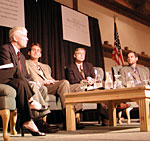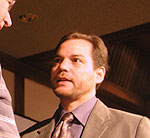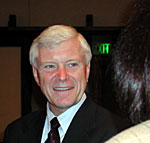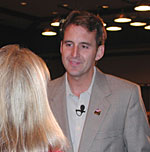By Jeff Horwich
Minnesota Public Radio
September 20, 2002
Minnesota's four major party candidates for governor met in Brainerd on Friday to talk health care. Ken Pentel of the Green Party, Tim Penny of the Independence Party, Republican Tim Pawlenty, and DFLer Roger Moe took questions before hundreds of hospital and nursing home workers from around the state. At times the candidates both celebrated and lamented the state of health care in Minnesota. The discussion was colored by the fact that whoever wins in November will need to improve the system on a tight state budget.
| |
|
|
|
||
The four candidates for governor got to relax a bit for this one. The format put them around a coffee table in high-backed easy chairs.
The debate was sponsored by the Minnesota Hospital and Healthcare Partnership and the Minnesota Health and Housing Alliance. Confronted with a ballroom full of healthcare workers, the candidates largely traded campaign rhetoric and personal challenges for policy details.
None painted a picture of Minnesota health and nursing home care in crisis. DFL candidate Roger Moe said any improvements will be made upon a strong foundation.
"Yes we agonize over the costs and we agonize in some cases over access, but we have a high quality system in this state because of the health care provides and systems we have. Can we improve, sure. But all I can tell you on a personal basis is I'm very thankful I live in Minnesota," Moe said.
| |
|
|
|
||
Moe sees one big challenge in the number of vacant health care jobs.
"We need to be more aggressive about post-secondary options particularly for our seniors in high school, so they get exposed to health care opportunities. Twelve percent of job vacancies in this state are in the health care field."
Republican candidate Tim Pawlenty says the next governor needs to fix problems that are decades old. For example, Pawlenty says, Minnesota hospitals will continue to hurt until they win higher federal payments for Medicare patients.
"Job one is to make sure we get a fair Medicare reimbursement rate. This issue has been lying around like a dead carp on the beach for 20 years we need to get the job done. And there's no reason why South Dakota's reimbursement rates are higher than southwestern Minnesota's," according to Pawlenty.
| |
|
|
|
||
Minnesota's need for nursing home care will shoot up as the baby boom generation gets older. Pawlenty says even on a tight budget, the state can help aging boomers to help themselves.
"We need to start encouraging and incentivising individuals to buy long-term care insurance. And we need to do a better job of that in Minnesota."
The Independence Party's Tim Penny said he doesn't plan to limit his vision just because the state won't have a lot of money to spend.
"In balancing budgets and setting priorities we have to look at where we want our health care system to be in the years ahead and begin even in this tough budget environment to move our policies in that direction," Penny said.
Penny garnered some rare applause with a promise to clear up red-tape for health care workers.
| |
|
|
|
||
"Do our level best to get rid of as much regulation in this industry as possible. Because people don't get into this profession to do paperwork. They get into it because of people."
For Green Party candidate Ken Pentel, the health care forum was a perfect platform for one of his most prominent campaign issues. The Green Party takes the most dramatic stance on the current competitive health care system.
"Health care is a right and it's not something we constantly are groveling to pay for in this society. Also we want to take steps to control drug prices, doctors fees, and take steps to go to a one payer, universal health care system," he said.
Pentel says the system needs to emphasize preventive care, not just the latest technologies.
| |
|
|
|
||
"We have about 250 to 500,000 people each year without insurance coverage. If they come to the door of a hospital on the brink of death, the costs are going to be much higher. If we can start investing early and addressing problems early, then we'll have a healthier population in general," Pentel said.
Pentel proposed a program similar to the GI Bill to encourage more people to enter nursing, the encouragement of volunteer health clinics to provide low-cost care for low-income customers, a statewide hospital board to assess where the most pressing needs are, and a one-payer universal health system.
More from MPR




